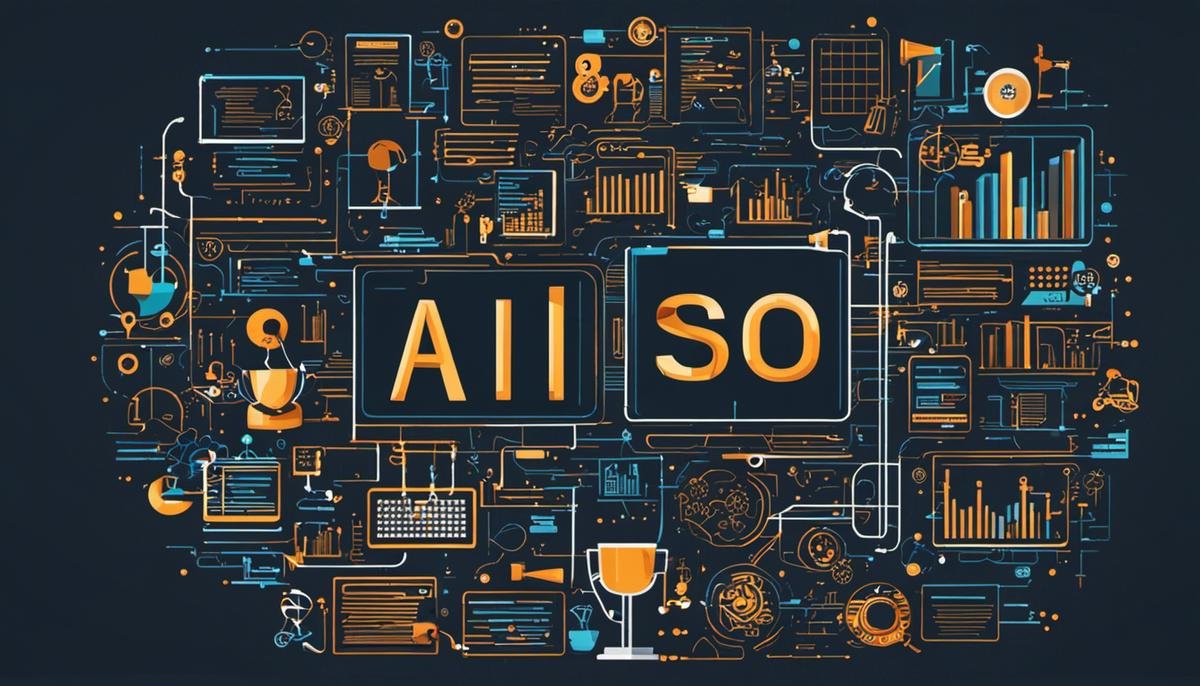Artificial Intelligence or AI, a concept once confined to science fiction, is now steadily being integrated into everyday business tasks, particularly in the rapidly evolving field of digital marketing. Shedding light on this technology-driven evolution, our discussion will traverse the multifaceted aspects of AI in marketing, introducing you to its various forms and the transformative role it plays. Moving ahead, we will delve into AI’s significant contributions to SEO and content marketing, elucidating how it optimizes keywords, content, and performance while predicting trends. The ensuing sections will discuss how AI personalizes customer experience, its deployment in social media marketing, and an in-depth exploration of the ethical considerations, challenges, and likely future of AI in digital marketing.
Understanding Artificial Intelligence (AI) in Marketing
Understanding Artificial Intelligence (AI) in Marketing
Artificial Intelligence (AI) is a field in computer science that uses advanced algorithms and models to enable computers to learn patterns, make decisions, and improve performance over time without explicit programming. The primary goal of AI is to stimulate human intelligence and its cognitive functions such as learning, problem-solving, and perception.
Types of Artificial Intelligence in Digital Marketing
There are several types of AI that can be used in digital marketing. Machine learning, a subset of AI, analyses data to predict future outcomes. Predictive analysis is used to predict consumer behavior. Natural language processing (NLP) enables machines to understand and respond to human language, allowing marketers to automate customer interactions. Moreover, AI Chatbots are programmed to interact with customers in real-time to answer queries and provide information about products and services.
AI’s Role in Changing Marketing Landscape
AI is changing the marketing landscape in many ways. It helps predict customer behavior by analyzing past transactions and interactions. This allows marketers to provide personalized product suggestions and improve customer retention. Machine learning algorithms can also predict the best time to interact with a client for optimum engagement.
AI-powered customer relationship management (CRM) systems automatically update customer information and track interactions, reducing manual entry and offering a complete customer view. Additionally, programmatic advertising uses AI to automate the buying and selling of ad inventory. This saves time, reduces human error, and optimizes the effectiveness of advertising campaigns.
AI also impacts content marketing. By analyzing user behavior and preferences, AI can help content creators generate materials that resonate more with their target audience. Plus, AI tools can also examine search patterns and social media trends to help companies identify popular topics and create content accordingly.
The Transformative Nature of AI in Marketing
The implementation of AI in marketing strategies can be transformative. It automates daily tasks, allowing marketers to focus more on strategy and creativity. AI systems provide valuable insights into customer behavior and preferences, enabling businesses to provide a personalized customer experience.
Moreover, AI’s predictive abilities allow for more accurate forecasting, improving marketing efficiency. For instance, it can predict which advertising campaigns will yield the best results or which customers are most likely to convert.
Finally, AI drives cost-efficiency by automating routine tasks, reducing the need for human intervention, and thereby reducing labor costs. It also optimizes advertising spend by targeting the most lucrative opportunities and discarding the less profitable ones.
Concluding Thoughts
Artificial Intelligence (AI) in digital marketing is an expanding field, creating exciting opportunities for understanding audience behavior, anticipating future trends, and enhancing operational efficiency. As technological advancement continues, AI’s role in marketing is poised to grow more prominent and intricate. Hence, businesses and marketers need to comprehend and adjust to these progressing AI innovations to remain competitive in the dynamic digital landscape.

AI-driven SEO and Content Marketing
AI’s Role in SEO and Content Marketing
AI has proven its versatility and indispensability in the realm of search engine optimization (SEO) and content marketing. Utilizing AI-enhanced tools empowers businesses to better align their SEO efforts, personalize their content based on real-time analytics, and enhance their online exposure to attract greater organic traffic to their sites, resulting in increased business opportunities and growth.
Keyword Research and AI
Keyword research lies at the heart of any successful SEO strategy. AI tools utilize machine learning to analyze search engine data and predict keyword relevance based on specific criteria, including search volume, competition level, and keyword intent. Through this process, AI-powered SEO tools provide highly targeted keyword suggestions that can increase the likelihood of a page ranking in search engine results.
AI and Content Creation
AI technology is also redefining the content creation process. With Natural Language Processing (NLP) and machine learning algorithms, it’s possible to produce content that’s tailor-made for specific audiences. These AI tools can analyze user behavior and preferences to generate content that aligns with user intent, improving engagement rates and overall user experience.
AI in Content Optimization
Content optimization is another critical aspect of SEO where AI proves beneficial. AI can analyze past content performance to learn what worked and what didn’t, helping develop a more strategized approach in content creation. By understanding user browsing habits, site navigation, and content preferences, AI can make data-backed recommendations for optimizing future content.
Predicting Trends with AI
AI’s predictive capabilities add another dimension to SEO and content marketing. Predictive analytics, powered by AI, can identify emerging trends and shifts in customer behavior by evaluating vast amounts of data in real time. This enables businesses to stay ahead of the curve by adjusting their SEO and content marketing strategies to capitalize on these emerging trends.
AI Tools for SEO and Content Marketing
Many AI tools designed specifically for SEO and content marketing are available on the market. These include platform like BrightEdge, Market Brew, and CanIRank, which use AI to analyze a site’s SEO performance, provide actionable insights, and predict future trends. For content marketing, platforms like Concured use AI to identify what type of content will resonate with an audience and can even automate content distribution across various channels.
Measuring Performance with AI
Finally, AI is critical in measuring the performance of SEO and content marketing strategies. Tools powered by AI can track a wide range of metrics, including organic traffic, bounce rate, and conversion rate, in real-time. They can also provide insights into how various SEO techniques affect these metrics, enabling marketers to adjust their strategies accordingly and use their resources more effectively.
By weaving AI into their SEO and content marketing campaigns, firms can significantly increase their online presence, boost user interactions, and accomplish their digital marketing objectives with greater effectiveness.

Personalization and Customer Experience with AI
How does Personalization in Digital Marketing AI Work?
When we talk about personalization in Digital Marketing AI, we’re referring to the bespoke experiences and content that are designed to match the tastes, behaviors, or instantaneous engagements of an individual. The combination of Artificial Intelligence (AI) and Machine Learning algorithms equip businesses with the tools to analyze and comprehend massive volumes of customer data. This allows them to deliver highly personalized and relevant content, interactions, or promotions to individual customers.
AI’s Role in Customer Segmentation
Simultaneously, AI plays an integral role in customer segmentation. By gleaning insights from raw data, AI can ascertain patterns and divide customers into different groups or segments based on shared characteristics or behaviors, such as demographic information, purchase history, and browsing habits. Individuals within these segments have similar needs and responses to marketing efforts.
These insights enable marketers to efficiently develop personalized marketing campaigns that are more likely to resonate with the targeted audiences, thus improving customer retention and fostering loyalty.
Driving Personalized Advertisements with AI
Artificial Intelligence also aids in driving personalized advertisements. Ads are created based on an individual’s personal preferences, browsing behaviors and online transactions, thereby enhancing the customer’s overall experience. Such targeted ads significantly improve click-through rates and drive higher conversions, as observed and used by many social media advertising platforms.
AI and Recommendation Engines
AI also makes use of recommendation engines to further enhance customer personalization. These powerful tools can predict and suggest products or services a customer might enjoy based on their historical data and predictive analysis. By doing so, businesses can flood their customers with highly accurate and personalized recommendations.
AI-powered recommendation engines have been deployed by many popular e-commerce platforms, resulting in increased customer engagement and accelerated sales.
AI Chatbots for Enhanced Customer Experience
Finally, AI’s influence extends to creating seamless customer experiences through the use of AI chatbots. These conversational AI models can simulate human conversations and provide instant, 24/7 support, helping resolve customer queries or issues more efficiently.
Moreover, AI chatbots learn from each interaction, thus improving their capacity to communicate effectively and identify personal customer needs over time. This personalized customer interaction results in higher customer satisfaction rates, improved brand image, and eventually, increased sales.
Conclusively, the power of personalization facilitated by AI has revolutionized digital marketing arena for businesses. By enhancing customer segmentation, creating personalized ads, recommendation systems, and chatbots, AI has dramatically improved the customer journey’s overall scope, making it more engaging and smooth.

AI in Social Media Marketing
AI Application in Social Media Marketing
The advent of Artificial Intelligence (AI) has brought a radical paradigm shift in the social media marketing landscape, fundamentally altering how businesses interact with their customers while providing a deep understanding of customer behavioral patterns. It’s a technological leap that has escalated digital marketing to unprecedented heights by optimizing efficiency, bolstering customer interactions, and taking advertising impact to a new echelon.
Social Listening Enabled by AI
One of the primary applications of AI in social media marketing is through improved social listening. Social listening refers to tracking conversations around specific phrases, words, or brands, and then leveraging those insights to discover opportunities or create content for specific audiences. AI algorithms can scan and analyze vast amounts of social media data to detect trends, track brand mentions, and understand conversations about particular topics. This allows marketers to gain deep insights into what their audience is talking about and tailor their marketing strategies accordingly.
AI and Targeted Advertising
AI has significantly improved the efficiency and effectiveness of advertising on social media platforms. With AI, marketers can use demographic data, user preferences, browsing history, and other variables to target their ads more precisely. This precision ensures that the advertisement reaches the right audience, which in turn potentially increases conversion rates and reduces advertising expenses. Machine Learning (ML), a subset of AI, can also predict user behaviors based on past activities, which can then be used to enhance advertising strategies.
Understanding Consumer Sentiment
AI is also instrumental in understanding and analyzing consumer sentiment. Through Natural Language Processing (NLP), AI can interpret emotions behind the text written on social media platforms. This allows marketers to gauge public sentiment about their brand or products and can guide them in making necessary adjustments to their marketing strategies. This accurate interpretation of consumer sentiment helps businesses create a more personalized experience for their audience, which can lead to higher satisfaction rates and potentially, brand loyalty.
Optimizing Social Media Posts
AI is not just useful in analyzing the data; it can also support the creation and optimization of social media posts. AI tools can predict the best times to post content based on user engagement data, ensuring maximum visibility and engagement. Furthermore, AI algorithms can suggest content that resonates with the target audience, fine-tune the tone and style of the content, and enhance visual elements for better appeal.
Moreover, several AI tools provide A/B testing features, allowing marketers to experiment with different kinds of content and gauge their effectiveness. These insights can be instrumental in refining a brand’s social media strategy and achieving its marketing objectives.
Artificial Intelligence Revolutionizes Social Media Marketing
Social media marketing is being reshaped by the influence and innovations brought about by Artificial Intelligence (AI). With AI’s dynamic capabilities, marketers are able to engage with their audience in unprecedented ways, offering more refined personalization and in-depth data analysis. This continuous technological progress provides marketing professionals with limitless opportunities to optimize their strategies, ensuring improved results.

Ethics, Challenges and Future of AI in Digital Marketing
Addressing the Ethical Aspects of AI in Digital Marketing
As AI continues to pervade digital marketing, it is essential to consider its ethical implications, particularly in terms of data privacy. AI’s ability to gather, process, and use personal data to craft precise advertisements often lacks explicit user consent, raising valid concerns about privacy rights. This can be illustrated by the infamous Cambridge Analytica scandal where millions of Facebook users’ data was misused for political propaganda without authorization.
Moreover, AI has the potential to perpetuate biases present in human-provided training data, leading to discriminatory advertising. For example, if an AI system learns from the shopping patterns of a specific demographic, it could create bias profiles which may result in unequal advertising practices. It’s an ethical dilemma because every consumer, regardless of their background, should have fair access to the products and services promoted online.
Challenges of AI in Digital Marketing
Apart from ethical issues, AI in digital marketing also comes with its technical and societal challenges. The increasing reliance on AI in digital marketing leads to the risk of job displacement. As AI technology continues to evolve, roles that were once performed by humans in marketing such as data analysis, customer segmentation, and even content-creation are being automated, thus reducing the need for human workers.
There are also concerns over transparency and control. AI algorithms often operate as a “black box,” with little insight into how they reach their decisions or actions. This lack of transparency can lead to distrust, particularly in scenarios where the AI makes seemingly incorrect or unfair decisions regarding advertising targeting or content generation.
Data security is another challenge. With the vast amounts of invaluable user data that AI systems handle, the threat of cyber attacks looms large. Securing this data while still using AI algorithms to gather meaningful insights for effective digital marketing campaigns remains a significant challenge.
The Future of AI in Digital Marketing
Despite these challenges, the future of AI in digital marketing appears promising. Companies can prepare for this future in several ways. Firstly, by adopting transparent and ethical data collection and usage practices, public trust could be gained. Adapting to AI-dominated fields by reskilling employees or restructuring job roles can help address job displacement threats.
Machine learning fairness is one potential solution to address AI bias. This involves technical measures to detect and counteract biases in training data so the AI system can make fair and objective decisions. Industry leaders like Google are already making strides in this direction.
Furthermore, federated learning, where AI models are trained across several devices holding local data, could be one way forward in maintaining personal privacy as it doesn’t require sharing raw data. Meanwhile, continuous advancements in cybersecurity tech, the evolving field of AI, and the application of stringent data governance policies are necessary steps to mitigate the data security challenges.
Case studies like Microsoft’s AI-driven marketing campaigns, IBM’s Watson campaigns, and how Amazon uses AI for personalized user experiences show the efficacy of AI in delivering promising returns for business. If deployed thoughtfully with attention to ethics and overcoming challenges, AI holds massive potential for digital marketing in the future.

As we have explored, AI’s potential to revolutionize digital marketing is immense. Its key roles in SEO, content marketing, customer experience personalization, and social media marketing have vastly improved efficiency, predictive accuracy, and user engagement. However, these advancements are not without challenges. It’s important to tackle data privacy concerns, biases, and potential job displacement to ensure fair, sustainable growth in the utilization of AI in marketing. By examining real-world case studies and envisaging potential solutions, we can navigate these issues while harnessing AI’s transformative power in digital marketing. Hence, it’s imperative for businesses to stay informed, adapt, and evolve as AI continues shaping the digital marketing landscape.



